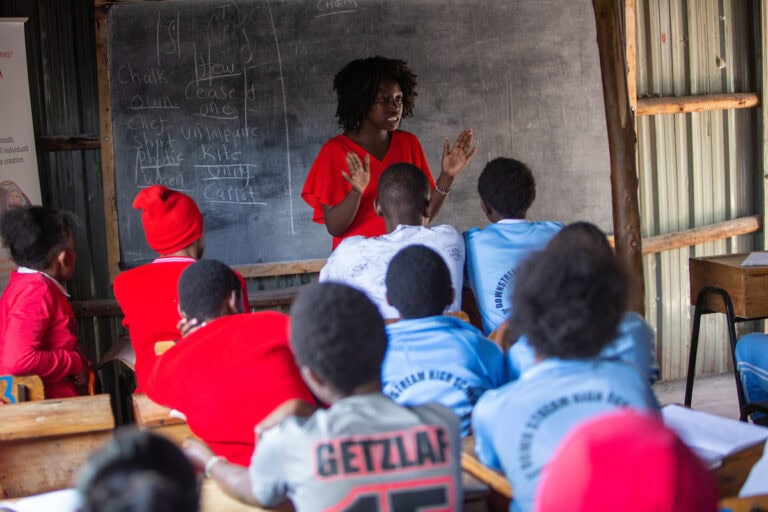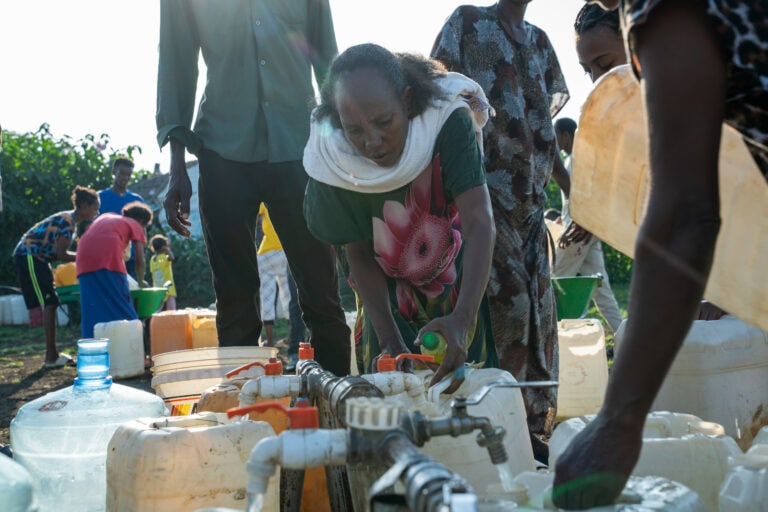The joint vision adopted at the 2022 AU-EU Summit recognises education as a key pillar of the partnership, notably through initiatives in Technical and Vocational Education and Training (TVET), teacher training, basic education and youth mobility. Its implementation however has primarily focused on skills development and employability, in connection with other key investment areas. The 2025 Ministerial Joint Communiqué reaffirmed the importance of education for innovation and job creation but lacked commitments to foundational learning, education in conflict-affected settings, gender equality, early childhood education, climate change in relation to education, and inclusive public systems.
This Summit offers a pivotal opportunity to reinforce commitments and translate them into sustained financing, equity-focused policies, and system-wide capacity for inclusive, quality education.
Building on the African Union’s Strategic Vision for Education
The AU’s 2024 Year of Education, themed “Educate an African Fit for the 21st Century”, catalysed renewed political commitment to education across the continent. It built on the previous Continental Education Strategy for Africa (CESA 2016–2025) and paved the way for the new one (CESA 2026–2035). Closing the AU Year of Education, the Nouakchott Declaration amplified the Ministers of Education call for an AU Decade for Accelerated Action for Education and Skills Development (2025–2034) to sustain momentum.
In 2024, the AU has reaffirmed priorities such as:
- Ensuring inclusive access to education, with a strong focus on gender equality, refugees, displaced persons, and persons with disabilities.
- Promoting lifelong learning from early childhood education and foundational learning to TVET and higher education.
- Strengthening links between TVET, emerging technologies and labor markets.
- Bridging digital divides through locally relevant content and stronger digital infrastructure.
- Enhancing teacher recruitment, providing continuous professional development, and ensuring gender equity in the education workforce.
- Prioritising education continuity in emergencies, with advocacy for dedicated national budgets to support “Education in Emergencies”.
- Scaling up the African Continental Education Management Information System (ACEMIS) to improve evidence-based decision-making.
Despite these commitments, as recently reported by Human Rights Watch, only a quarter of African states met UNESCO’s education funding benchmarks of 15-20% of their total public expenditure in 2022–23, putting this vision at risk.
Revamping the human development and the education dimensions in the EU’s Global Gateway
Within the EU’s Global Gateway strategy, education and training has been identified as one strand of the EU-Africa investment package. Key initiatives include TVET support, the Regional Teachers’ Initiative, contribution to the Global Partnership for Education for basic education, and Youth Mobility for Africa.
The new Global Gateway’s “360-degree” approach links education investments directly to strategic sectors such as energy, digital, and green transitions, seeking to ensure that local workforces have the skills to sustain major infrastructure and industrial developments.
A 2025 European Parliament study warns that the Global Gateway prioritises infrastructure and private-sector interests over human development, overlooking key education needs like recruitment and training of qualified teachers, inclusive access, and foundational learning, especially in low-income and fragile contexts. It emphasises that education requires sustained public funding, which large-scale investment models fail to guarantee.
However, projections from UNESCO’s Global Education Monitoring Report warn that global aid to education could drop by 25% by 2027, making it imperative that EU ODA remains a reliable pillar for education.
Key concerns therefore remain:
- The shift in EU education funding from basic education to TVET and post-secondary education risks sidelining foundational learning and early childhood development.
- Some investments tend to be shaped more by foreign investors’ needs than African education priorities.
- The move away from sectoral budget support weakens financing and capacity in low-income countries.
- The Global Gateway’s focus on large-scale infrastructure must not come at the cost of human development and inclusive, quality learning at all levels.
Recommendations for the 2025 Summit
To reinforce inclusive quality education as a strategic investment for sustainable development in the EU-AU partnership, we urge AU and EU leaders to:
- Align Global Gateway education investments with AU priorities and a lifelong learning approach (outlined in the CESA 2016–2025, CESA 2026-2035 and the AU Decade for Education Transformation 2025-2034)
- Advance inclusive education pathways in terms of both learning spaces and the curriculum, while addressing interconnected needs – including nutrition, health, psychosocial support, and protection. With this purpose, emphasise gender equality
and disability inclusion (recognising the higher barriers faced during emergencies and by persons with intellectual and psychosocial disabilities). - Protect education in emergencies and in the face of climate vulnerabilities by reaffirming the commitment to the Safe Schools Declaration; empowering children, young people, educators and affected communities to actively engage in education protection initiatives; and integrating climate literacy across school and teacher curricula.
- Uphold 20% national budget benchmark for education and address debt distress, which has a huge impact on financing public education systems on the continent (African States are spending over 12% of their national budgets servicing debt, according to a recent report on Transforming Education Financing in Africa).
- Safeguard EU Official Development Assistance (ODA) for education, which should aim to strengthen public systems and be centered on learners, including in fragile and crisis-affected contexts.
- Strengthen the joint AU-EU programming that addresses shortages, skills development, adequate remuneration, and gender and geographic diversity in the teaching workforce (including through expansion of the Regional Teachers Initiative), as well as disaggregated data for evidence-based policymaking (notably by supporting the African Continental Education Management Information System).
- Ensure civil society participation – especially that of learners and representatives of traditionally marginalised groups – in the design, implementation, monitoring and evaluation of programmes and initiatives.
Read the letter with the full list of signatories here.



